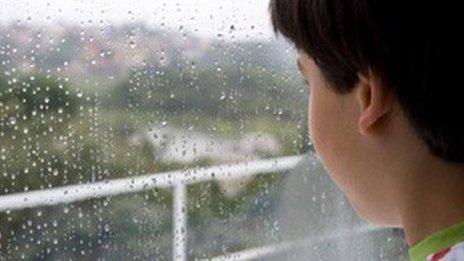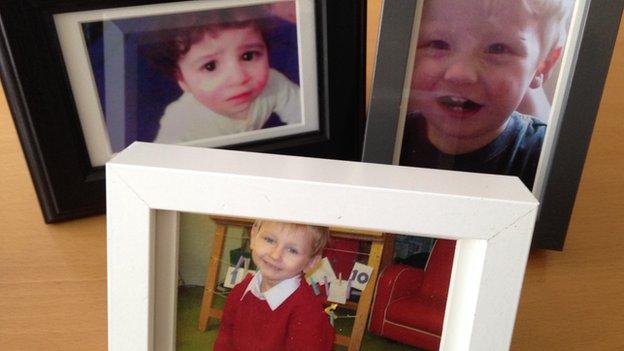NSPCC: Child protection services forced to struggle
- Published

The report says only one in nine of those who need support are getting it
Children's social services are so stretched that they are struggling to do more than merely respond to emergencies, a report says.
The NSPCC report suggests many councils are raising the threshold at which they intervene to protect children, because of rising demand.
The charity estimates that just one in nine of children and young people who are at risk are receiving support.
The government said it was improving child protection by cutting red tape.
The report, entitled How Safe Are Our Children 2014, says demand for support and intervention has been growing as more families are suffering financially, and more people are willing to identify abuse and demand action in the wake of the Jimmy Savile scandal.
It is based on a number of different research projects by the NSPCC over the past year.
It says some of the early intervention services which might support families to stay on track and prevent problems escalating - such as children's centres or domestic violence services - have been cut back.
This will store up even more costs and problems for later, it adds.
'Pain and suffering'
"Without this vital prevention work, children's social services are less and less able to cope with demand and more children are suffering," the report says.
The report also highlights the growth of new and emerging issues such as online abuse, teenage depression and self-harm.
NSPCC chief executive Peter Wanless said: "With record reporting of child abuse, hard-pressed children's social service departments have little choice but to raise the threshold of where they act.
"This is leaving large numbers of children with no statutory support. Acting alone, children's social services struggle to be more than an emergency service, getting involved when pain and suffering for children is already entrenched or risk is very high.
"Whilst poverty does not cause child abuse or neglect, it can put additional strain on families that are already struggling and tip them over the edge."
The NSPCC says it wants to see greater investment in services and more support for children, but acknowledges the tough financial situation.
It argues that teachers, nursery workers, police officers, doctors, nurses and all professionals who come into contact with children should play a part.
'Patchwork'
Mr Wanless added: "We know that small and simple interventions early on can and do stop abuse and neglect for a fraction of the cost of trying to tackle it later down the line.
"Successive governments have talked the talk on 'early intervention' and joined-up services but have failed to deliver lasting change.
"Early help is a patchwork of different services and people, with it too often being a matter of chance if abuse or neglect is prevented or detected early."
A Department of Education spokesman said the "vast majority" of councils protected children social care budgets from cuts.
He said: "According to an independent Audit Commission report, council spending on children's social care on average increased by 1.2% in real terms since 2010-11.
"As this report shows, they [councils] are taking action to protect more children, and Ofsted inspections are checking that children are getting the right help at the right time.
"However, it is still up to councils to ensure that staffing and caseloads are at appropriate levels to manage risk to local children.
"We are improving child protection - cutting red tape and improving the skills and experience of social workers so they can make the right decisions for children."
The department also said that it had launched a new fast-track frontline training programme, which it hoped would "attract the brightest and best to social work".
- Published26 March 2014

- Published25 March 2014
